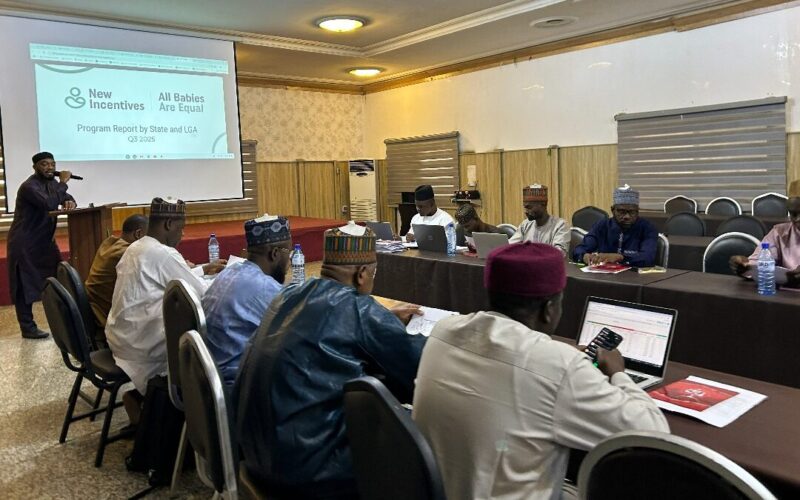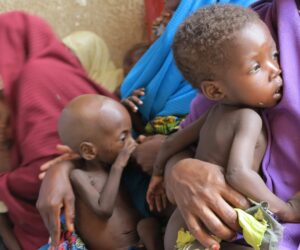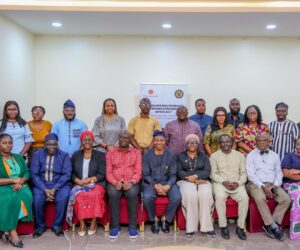The All Babies programme, implemented by New Incentives – All Babies Are Equal (NI-ABAE), has intensified efforts to improve vaccine access and coordination across northern Nigeria.
The organisation convened a two-day cold chain stakeholders’ roundtable on 24 to 25 October in Kano State, to strengthen collaboration and accountability within vaccine supply chains across its states of operation.
According to a statement shared by the organisation on Wednesday, the meeting brought together 35 participants from zonal and state cold chain offices, the Kano State Primary Health Care Board, NI-ABAE staff, and development partners to review vaccine stock trends, data systems, and distribution performance across 14 states.
 The participating states include Adamawa, Bauchi, Borno, Gombe, Jigawa, Kaduna, Kano, Kebbi, Katsina, Niger, Sokoto, Taraba, Yobe, and Zamfara, covering the North-West, North-East, and part of the North-Central region.
The participating states include Adamawa, Bauchi, Borno, Gombe, Jigawa, Kaduna, Kano, Kebbi, Katsina, Niger, Sokoto, Taraba, Yobe, and Zamfara, covering the North-West, North-East, and part of the North-Central region.
Speaking at the opening, NI-ABAE Stakeholder Relations Director, Nura Muhammad, said the meeting was part of ongoing collaboration to ensure vaccine availability at all levels.
Progress in immunisation coverage
Presenting the Q3 2025 impact report, NI-ABAE Monitoring and Learning Officer, Nana Ize, said the programme continues to make gains in reducing zero-dose infants across northern states.
Katsina and Zamfara recorded the sharpest progress, each achieving a 40-percentage-point reduction, while Kaduna saw a 15-percentage-point decline since the programme’s rollout.
As of the third quarter of 2025, the group said the programme has enrolled 5.6 million infants across 204 local government areas, supporting services in 7,128 clinics and 60,000 settlements.
Since its inception, the programme has encouraged over 85 million vaccinations and disbursed more than N32 billion in direct cash transfers to caregivers.
The Senior States Partnerships Manager, Abdulwahab Yusuf, presented a comparative review of 2024–2025 vaccine stock trends, highlighting national shortages of the Rota vaccine, delays in redistribution, and incomplete reporting on OpenLMIS, Nigeria’s national digital vaccine-tracking platform.
 Stakeholders resolved to strengthen real-time data visibility, improve the timeliness of OpenLMIS updates, and enhance coordination between state and local government levels to reduce stockouts before the end of the year.
Stakeholders resolved to strengthen real-time data visibility, improve the timeliness of OpenLMIS updates, and enhance coordination between state and local government levels to reduce stockouts before the end of the year.
Closing last-mile gaps
Participants also agreed to engage the Association of Local Governments of Nigeria (ALGON) to advocate for increased transport funding and logistical support for health workers.
The goal is to improve vaccine movement from local government cold stores to clinics. “This approach aims to close the final gap in the vaccine distribution chain, the ‘last mile’ – where most interruptions occur,” the group noted.
Abubakar Hussaini, the State Cold Chain Officer for Niger State, commended the programme’s contribution to vaccination turnout in the region.
“All Babies has done a great job increasing vaccination awareness and turnout in Niger State. With their support, caregivers now come out in large numbers. We hope the programme expands nationwide so every child benefits from these life-saving vaccines,” Mr Hussaini said.
Shared accountability
The meeting ended with a joint communique committing participants to train routine immunisation providers on vaccine stock management, strengthening supervision to ensure timely movement of vaccines from state and local stores to clinics, and enforcing OpenLMIS compliance through weekly reporting and follow-up.
READ ALSO: Millions of children still lack access to vaccines – UN
States also agreed to adopt Niger’s ‘one-time supply’ model for hard-to-reach areas and to convene regular zonal coordination meetings in Kano to address pickup delays at the facility level.
Stakeholders confirmed that Rota vaccine shipments delayed by manufacturing challenges are expected to arrive in Nigeria by 1 November.
NI-ABAE is a child health initiative that promotes demand for routine immunisation in northern Nigeria through conditional cash transfers to caregivers.
The programme works closely with state governments, local health authorities, and community leaders to ensure every eligible infant receives all recommended vaccines.
It continues to strengthen Nigeria’s immunisation system through evidence-based incentives, data-driven monitoring, and strong community partnerships.









